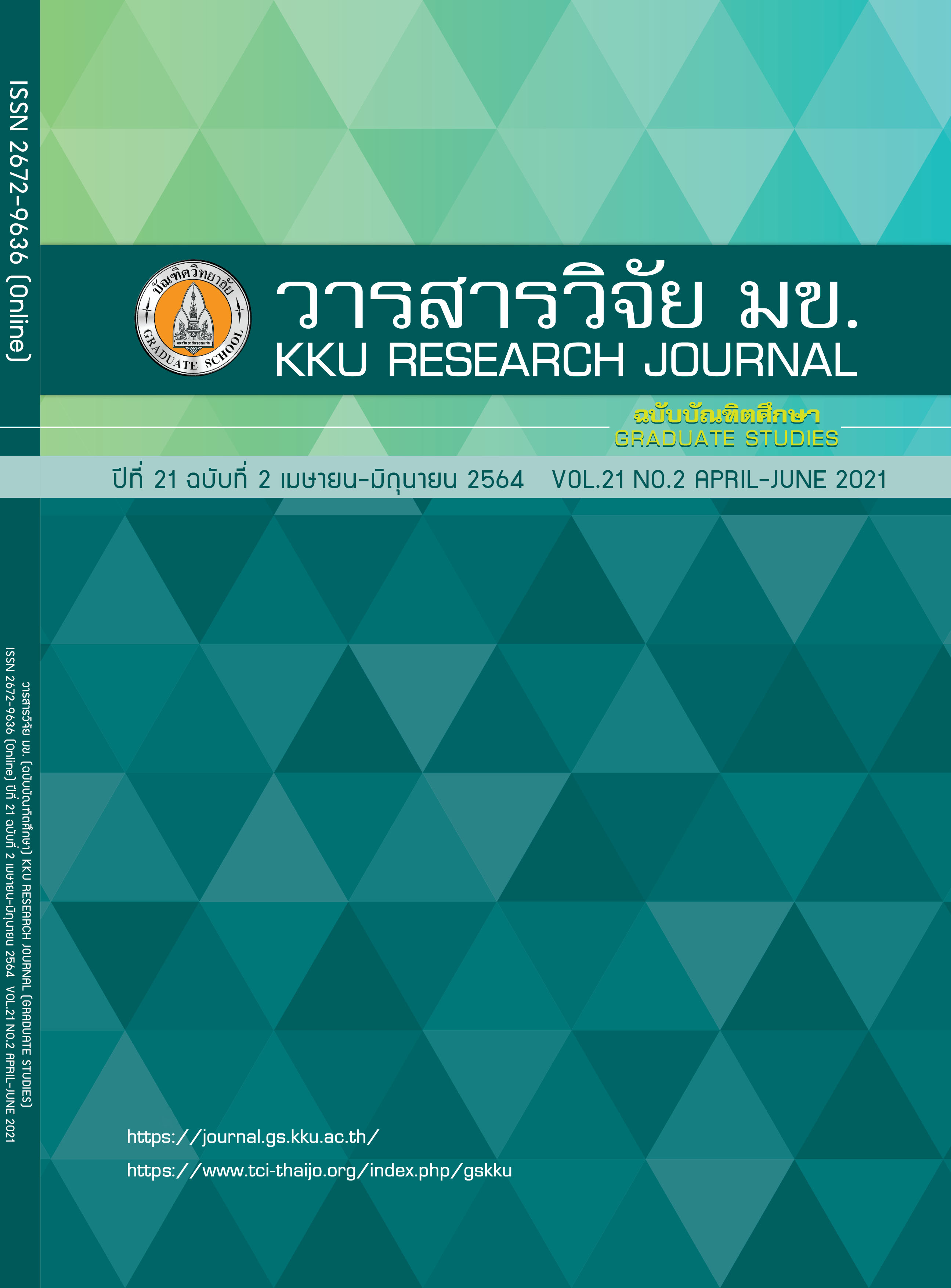Heat Loss of Coconut Sugar Simmering Stove
Keywords:
Thermal Energy Loss, Coconut Sugar Simmering StoveAbstract
This study aimed to study the heat loss of coconut sugar simmering stove by use the principle of heat loss analysis for equipment. Findings were as follows: Heat loss from flue gas was the highest value as 308,371.43 KJ (34.54±1.51 %), followed by incomplete combustion as 162,944.49 KJ (18.25±6.94 %), ash, char and unaccounted as 138,785.45 KJ (15.54±5.65 %), surfaces as 59,449.05 KJ (6.66±0.81 %), hydrogen in fuels as 30,389.771 KJ (3.40±0.05 %) and moisture in fuels was the lowest value as 3,827.176 KJ (0.43±0.01 %). Therefore, the results of this study should be used as supplementary information for the development of coconut sugar simmering stove to for better quality.
References
Food and Agriculture Organization of the United Nations. World agriculture: towards 2015/2030 [Internet]. 2018 [updated 2018 Sep 29; cited 2018 Dec 29. Available from: http://www.fao.org/docrep/004/y3557e/y3557e00.htm# TopOfPage
Wasananon D. Sugar Cane & Sugar Palm. Veterinary & Remount Department Journal. 2008; 25 (2): 26-28. Thai.
Tho̜ngamphai P. Sugar Coconut Sweet Hope [Internet]. 2018 [updated 2018 Sep 29; cited 2018 Dec 29. Available from http://www.komchadluek.net/news/agricultural/233190
Morakun W, Kanphangam S, Duriyang A. Dried Coconut Using A Heat Pump Dryers [BE thesis]. Engineering: Silpakorn University; 2007. Thai.
Natan J, Urukhachen N, Muangha W. Guidelines for The Study on Efficiency of Coconut Sugar Cooking Stove [BE thesis]. Engineering: Silpakorn University; 2010. Thai.
Thepphakon W. Coconut Sugar Sweetness of Thai Wisdom. Bangkok: Aksoncharœnthat; 2005. Thai.
Thimto K. Production of organic coconut sugar Tambon Bangkhla Amphoe Ban laem Phetchaburi Province. Phetchaburi: Phetchaburi Rajabhat University; 2004. Thai.
Wanletlak W. Fluid Knowledge [Internet]. 2018 [updated 2018 Sep 29; cited 2018 Dec 29. Available from http://www.scimath.org/lesson-physics/item/7268-fluid
Eastlake CN. An Aerodynamicist’s View of Lift, Bernoulli, and Newton. THE PHYSICS TEACHER. 2002; 40: 166-173.
Andrej SC, Janez O, Brane S. Annular shaft kiln for lime burning with kiln gas recirculation. Applied Thermal Engineering. 2008; 28 (7): 785-792.
Michele DM, Elio P, Dario P. Waste heat recovery in a coffee roasting plant. Applied Thermal Engineering. 2003; 23 (8): 1033-1044.
Wasananon S. Thermal Efficiency Improvement of Coconut Sugar Simmering Stove. Veridian E-Journal, Science and Technology Silpakorn University. 2018; 5 (5): 73-88. Thai.
Ayoub M, Ezeddine S, Mohieddine BS. Assessment of thermal heat loss from solar cavity receiver with Lattice Boltzmann method. Solar Energy Volume. 2018; 173 (Oct): 1115-1125.
Jayashree N, Mohit A, Saumyakanta M, Sudhansu SS, Ranjan KS, Antaryami M. Combined heat loss analysis of trapezoidal shaped solar cooker cavity using computational approach. Case Studies in Thermal Engineering. 2018; 12 (Sep): 94-103.
Ka LL, Alfonso C, Mehdi J, Maziar A, Bassam D, Graham N. Experimental investigation of the effects of wind speed and yaw angle on heat losses from a heated cavity. Solar Energy Volume. 2018; 165 (May): 178-188.
Beata H, Zbigniew M, Marcin R. Energy losses from the furnace chamber walls during heating and heat treatment of heavy forgings. Energy. 2017; 139 (Nov): 298-314.
Brookhaven national laboratory safety & health services division. Environmental and Climate Sciences Department [Internet]. 2018 [updated 2018 Sep 29; cited 2018 Dec 29. Available from https://www.bnl.gov/envsci/envtech/.



